One evening in 2007, as I wrapped up a presentation at an art festival in Panjim on the role Goan jazz musicians had played in bringing swing to the Hindi film industry in the 1950s, a woman came up to me with tears in her eyes. “You played a track with my mummy on it,” she said.
Her mother, I knew immediately, was the pioneering pianist Lucilla Pacheco. In the 1940s, Lucilla Pacheco was one of the few women on the Bombay jazz scene, playing in the all-star band of Mickey Correa at the Taj Mahal Hotel and with the Anglo-Indian band leader Ken Mac. She later joined the Hindi film industry, and performed regularly with the arranger Anthony Gonsalves. But she isn’t remembered merely for being a woman in a man’s world. In the 1960s, she introduced the Hindi films to their first electronic instrument: the Solovox.

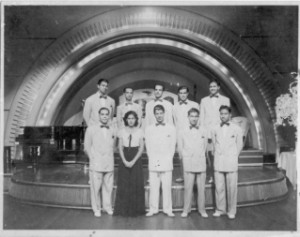
Lucilla Pacheco and the Mickey Correa band, with her husband George (left) and Correa (middle of the row).
I was surprised that I hadn’t run into the Pachecos earlier. For more than three decades, they lived on the same floor as my great-grandmother and one of my aunts in Liberty Flats on Hill Road, in the Bombay suburb of Bandra. But perhaps because the Pachecos’ flat has to be approached by a different staircase, it took a random encounter in Goa for me to come into contact with a family that had shared a wall with my family for much of my life. As it turns out, Lucilla Pacheco’s daughter, Jenny Blanche, knew many of my cousins. She put me in touch with her brother Alvino Pacheco in Bandra, and, over the next few years, he generously shared memories of his family’s musical life and put me in touch with his musician-cousins spread out around the country, in Calcutta and Delhi.
Lucilla Pacheco’s family history makes it clear that the gharana tradition isn’t just restricted to performers of Hindustani classical music. Performing music was a family occupation for many Goans too. But unlike the Hindustani gharana tradition, which values stylistic continuity, the Goan musician-families showed a remarkable enthusiasm for adopting each new style of Western music that became popular. From Western classical music to light opera to jazz (and later rock and roll), they grabbed it all, sometimes mastering several different genres of music over the course of a single lifetime.

Before she married the saxophonist George Pacheco, Lucilla was a Menezes, born to a family from Sao Mathias, a village on Goa’s beautiful Divar island. Her maternal grandfather was a violinist who went by the nickname “Rogddu”, while her paternal grandfather was known by the instrument of which he was a virtuoso – “Boncao”, the Konkani word for double bass. But her father, Mathias, moved to Colombo in Ceylon, where he taught music and ran an instrument shop. Mathias Menezes is said to have 600 pianos, which he rented out all across the region. He would sail to the Maldives and Mauritius to deliver pianos and tune them. He was said to have been a strict taskmaster but he earned the affection of three generations of Sinhalese students of Western classical music, who knew him fondly as Papa.
Over the last 60 years, the Menezes family have been pillars of the jazz scene in three cities: pianist “Baby” and vibraphonist Anto Menezes in Calcutta, pianist Mohsin Menezes in Delhi and, of course, Lucilla in Bombay.
Lucilla Pacheco moved to Bombay in 1948, the year after she married George Pacheco, who hailed from the village of Piedade, on the other side of Divar island. He’d been sent to Colombo to apprentice at her father’s shop. In their early years, the couple lived in Sargent House in Colaba. She had passed the classical examinations conducted by both the Trinity College of London and the Royal College of Music and started her professional life in Bombay giving piano lessons. Soon, she was accompanying films at the Metro theatre and, between shows, worked as a music demonstrator at the Furtado’s music store opposite. In an era when many people bought sheet music to play at home, Pacheco would perform the scores they contemplated purchasing, to show them how good the tunes could sound.
It wasn’t long before she was invited to join Mickey Correa’s band, a legendary dance band that proved to be the nursery of the city’s best swing musicians over the next two decades. She then worked under the baton of such top-flight leaders as Ken Mac and Chic Chocolate. On the side, she was a regular member of the Bombay Swing Club “Ork”, an outfit that had been started by jazz musicians and fans at the end of 1948 to prove that jazz wasn’t merely dance music. The BSC aimed to be a “show-window of swing” that would allow musicians to demonstrate their talents “to best advantage and to spread the taste of this truly international language”, explained one club brochure. She was a darling of both the crowds and the critics. Reporting on one of AIR’s regularly Monday night swing music broadcasts in 1955, the Free Press Bulletin noted that “pianist Lucilla Pacheco cornered the glory for a brief spell when the band went into I Remember April”.
Lucilla and George Pacheco had made a decision never to work in the same band so that they could minimise friction, though, their children noted ruefully, the couple had a tempestuous marriage. As her husband took to performing on cruise ships, Pacheco started spending most of her time in the Hindi film studios. “She must have had a hell of a time in that world of men,” her son Alvino suggested. “She probably had to put up with crude remarks all the time.”
In the mid-’60s, Pacheco caused a sensation in the studios by becoming the first player of an electronic instrument, an electronic keyboard called the Solovox. Her husband had bought it on one of her trips abroad.
Lucilla Pacheco spent her last years giving music lessons on Hill Road. Shortly before she died 1989 at the age of 60, the Goan writer Mario Cabral e Sa suggested that she should let him write her memoirs. “On no, Mario,” she said. “Please don’t. I’ve forgotten all my music. In the kind of music I now do, all you have to do is produce some kind of noise.”
Here’s the recording I played at the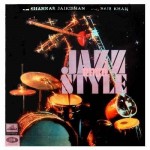 presentation in Goa that made Jenny weep. It’s Raga Todi, from the 1968 album Raga Jazz Style by the film composers Shankar and Jaikishan.
presentation in Goa that made Jenny weep. It’s Raga Todi, from the 1968 album Raga Jazz Style by the film composers Shankar and Jaikishan.


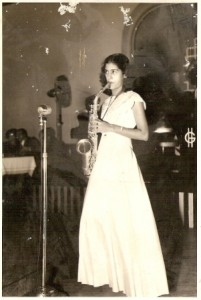
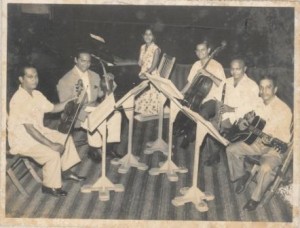
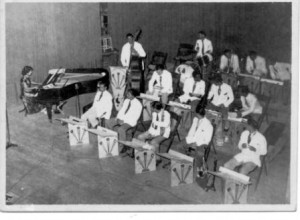
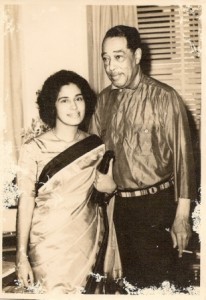
14 comments
Lucilla’s piano playing was the mainstay of many popular hindi film songs of the 50s through the 60s When you see the hero or the heroine running over the keys its Lucilla you hear in the background Sadly, most of this is undocumented
And if my memory serves me right George Pacheco also led a band at Gaylords, Churchgate for some time late 60s
Naresh just a few more inputs if you like…She had her own band as well, at (trying to remember the restaurant..) and was famous for her Boogie Woogies and jam sessions (the hotel was opposite Churchgate there were two restaurants…it was the time of cabarets, tasteful ones!). About her remark to Mario Cabral: after having developed a ear for western classical harmonies, and the depths of 5ths, 9ths, augmenteds and the like, she didn’t feel musically challenged.
You can hear her on a track in the film Anarkali, playing the Solovox which was bought via Portuguese Goa.
Hi Jenny,
It was touching to read about your meeting with Naresh.Ive always been fascinated by the contribution of Goan musicians in music.Im glad that Naresh is finally doling it.
Ravi
I chanced upon this page while surfing and I realized that Jenny is my mother Tina’s cousin. And George Pacheco was her maternal uncle. Her mother Artimizia’s elder brother. Nice to find family on the net and am marveling at the talent of Lucilla and George. Hopefully someone is carrying the family legacy forward. Cheers,
D Rodrigues
Wow ! I lived opposite her for so many years and knew she gave piano lessons, but never knew she was a pioneering jazz legend.
Knew Jenny the oldest well and her sister and brother too.
Cyrus Bulsara
I am Alvino’s friend and whenever we bunked college and went to his house we would get Aunty Lucilla to play for us songs on the Piano. She was a wonderful person but strict with Al. Fantastic musician.
Thanks Naresh for giving my aunt Lucilla’s name immortality. She was indeed a lady of many talents. She was also an excellent dancer who captivated the spectators when she did the jive on the dance floor. I owe her the gratitude for teaching me to jive which I enjoy to this day.
I am Lucila’s youngest sister. I was born in Sri Lanka but now live in Sydney, Australia. I came across this article while surfing the net and after reading it I realize how little I knew of my big sister. I am so proud of her for she was indeed a star. Music is a god given talent and we are so grateful to our father who nurtured this in us and I am proud to be one of the “Menezes”
Hi Naresh, time to stitch the South Asian jazz narrative into the rich history of Jazz that ignores the jazz men and women in this part of the world…
I just played and recorded Hindi film song ‘Man Dole Mera Tan Dole’ from film Nagin. It is famous for its snake charmer music.I created snake charmer flute sound using some of the sounds on my keyboard. I knew the original music was also not played on snake charmer flute, but it was played on early time keyboard, probably clavioline or Solovox mentioned in the article. The composer of the film was Hemant Kumar. Most people knew his two assistants Ravi and Kalyanji had main contribution to the most famous snake charmer flute played on Solovox. But there were debates about who contributed how much.
Before putting my instrumental remix on my blog, I googled and found out from the person who interviewed Ravi, Here is what Ravi said. The original snake charmer music piece was composed by Lucilla!!! The composer thought it needed to be made little more Indian. So Ravi rearranged it on Harmonium. In final version, Ravi on Harmonium and Kalyanji on Solovox played the piece together to create the snake charmer flute sound. It is the most popular song in the history of Hindi film. The music on Solovox sounds better than the snake charmer flute. Snake charmers for last 60 years use this piece for street entertainment. Lucilla’s admirers, friends and family members can be very proud for writing one of the most famous compositions of Indian Music. I am surprised why she is not mentioned in the Wiki
Oasis Thacker
Naresh, ‘Baby Menezes had his piano shop,just off Freeschool st in Calcutta in late 40s and early 50s, musicians used to hang out there , me too ,as an eighteen year old singing weekends with Tony D,Souza,s band , Baby played regularly at the Grail club ,his band was there when in ‘ 53 , when I entered and won the Big talent contest , it was on a whim and Baby sugessted a boogie Woogie vocal , I was leaving ,when the MC,s wife Whispered to me ‘ don’t go , you’ve won , ‘. Baby’s piano work had done the trick , Returning to Calcutta after nearly 20 years , I asked for him , The Dapper confident jazz pianist was ositting on a pavement , he remembered me ” Frankie, buy me a drink ” he said , broke my heart, ! I don’t know what happened to the D,Souza brothers and their separate bands ,
Thank you Naresh for this beautiful article on my Aunty Lucilla. She taught me jazz piano for a few years when I was young. Talented and patient. I am so proud of Aunty♥️
Naresh I would like to introduce you to my uncle Mosin Menezes from Delhi.
I made a video using content from this blog, great work:
https://www.youtube.com/watch?v=3jeFQXxqidw